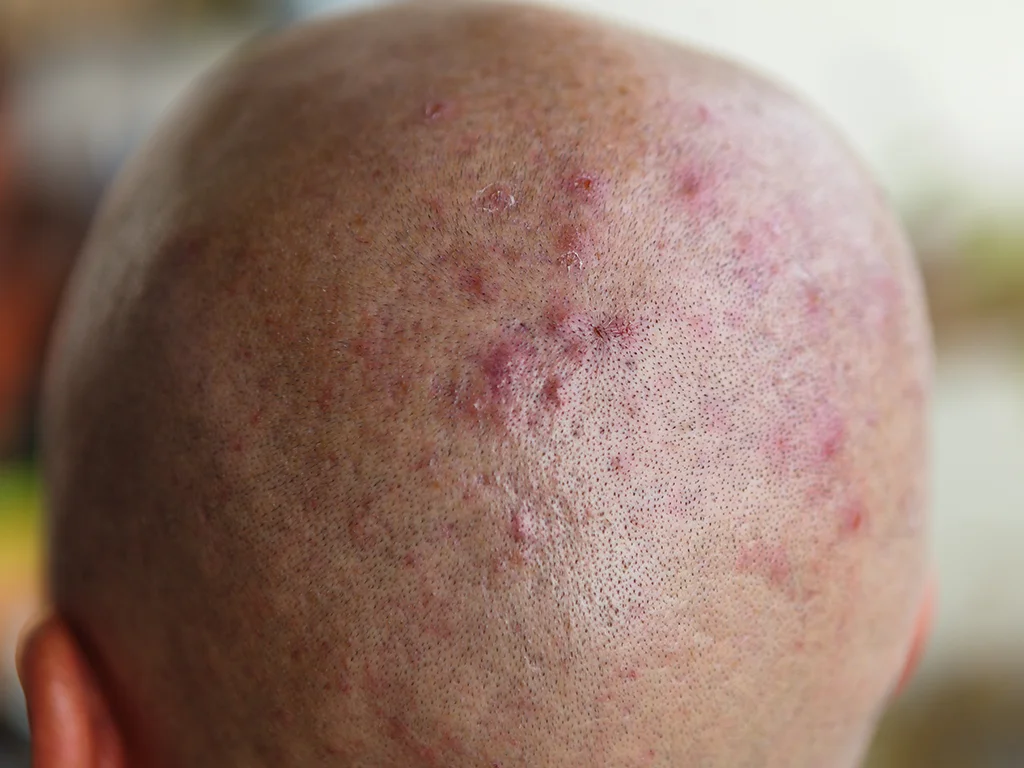
Expert Treatments for Scalp Acne: From Peels to Personalised Routines
Scalp acne can be just as persistent and frustrating as acne found on any other part of the body, perhaps even more so due to its hidden nature and the discomfort it causes. This often overlooked condition can affect anyone, regardless of age or hair type, leading to soreness and potential hair care difficulties. This blog explores advanced scalp acne treatments designed by trichologists to tackle this common issue effectively, offering insights into their benefits and how they can be integrated into your daily hair care regimen.
Scalp Acne Treatments by Trichologists
Effectively treating scalp acne requires specialised knowledge and approaches tailored to the unique environment of the scalp.
1. Scalp Peel
A scalp peel is a specialised chemical exfoliation treatment that leverages active ingredients like glycolic acid and willow bark to rejuvenate the scalp. This process helps in deeply cleansing the scalp, restoring its pH balance, controlling sebum production, and unclogging hair follicles. The active ingredients are particularly effective in targeting the root causes of scalp acne, making this treatment a cornerstone for those seeking to enhance scalp health and boost the effectiveness of subsequent hair care products.
2. Scalp Facial
Scalp facials, particularly the Hydrafacial®️ for the scalp, are comprehensive treatments that cleanse, exfoliate, and hydrate the scalp using a patented technology. This treatment effectively removes impurities and excess oil, which are common contributors to scalp acne. By ensuring the scalp is clean and balanced, scalp facials can significantly reduce the presence of pimples and prevent future breakouts.
3. Klear™️ Anti Acne Drip
The Klear™️ Anti Acne Drip is a breakthrough treatment that delivers a blend of essential nutrients such as vitamin C and zinc directly to the scalp. These ingredients are known for their anti-inflammatory and antibacterial properties, which can calm existing acne and prevent new pimples from forming. The drip enhances the effectiveness of topical treatments and provides a quick, efficient solution for those with busy schedules, aiming to reduce scalp inflammation and promote a healthier scalp environment.
4. Customised Scalp Routine
A tailored scalp care routine is vital in managing scalp acne. Our trichologists can help design a regimen that includes the right shampoos, conditioners, and treatments to address individual scalp needs, focusing on products that minimise oil buildup and keep the scalp clean without over-drying. Regular care and the right products are crucial in maintaining long-term scalp health and preventing acne recurrence.
What Causes Scalp Acne?
Scalp acne develops when hair follicles become clogged with oil and dead skin cells. Here are some common triggers:
- Excessive Oil Production: Overactive sebaceous glands can lead to oil buildup, clogging pores.
- Product Buildup: Heavy styling products can accumulate on the scalp and contribute to clogging.
- Sweat and Dirt:Accumulation of sweat and dirt can irritate the scalp and exacerbate acne formation.
- Hormonal Fluctuations: Changes in hormones can increase oil production, leading to acne.
- Poor Hygiene:Infrequent washing and improper cleansing can leave oil and product residue that blocks follicles.
How to Prevent Scalp Acne?
Preventing scalp acne involves maintaining a clean and balanced scalp environment. Here are five preventative steps:
- Choose the Right Products: Use non-comedogenic and oil-free hair products.
- Cleanse Regularly: Wash your hair regularly to remove excess oil and dirt.
- Maintain Hair Tools: Keep hair brushes and accessories clean to avoid transferring oil and bacteria.
- Avoid Irritants: Limit the use of heavy oils and styling products that can clog pores.
- Healthy Diet: Consume a balanced diet rich in vitamins and minerals to support skin health.
Takeaway
If scalp acne is affecting your quality of life, don't hesitate to seek professional help. Book an appointment with our trichologists can provide you with a personalised treatment plan tailored to your specific needs. With the right care, you can achieve a clean, healthy scalp and say goodbye to scalp acne for good. Start your journey towards a clearer scalp today!
Frequently Asked Questions
While scalp acne itself is generally harmless, it can sometimes lead to discomfort, itching, and if not treated properly, infection or scarring. It’s important to address scalp acne to avoid these complications and maintain overall scalp health.
Washing your hair too frequently can strip the scalp of its natural oils, which might exacerbate scalp acne. Instead, it's advisable to wash your hair a regular number of times with a shampoo formulated for sensitive or acne-prone skin types to manage oil levels without causing dryness.